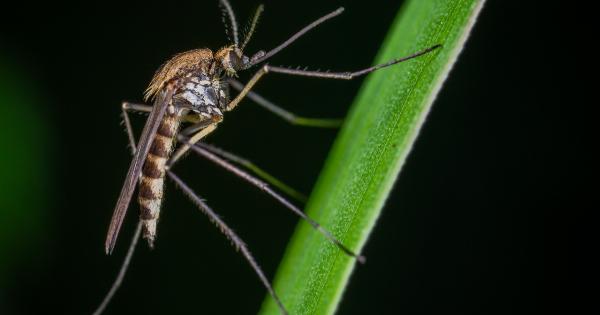Mosquitoes are small insects that belong to the family Culicidae. They are infamous for their annoying bites and the diseases they transmit. These tiny creatures have evolved various mechanisms to easily locate and feed on human blood.
In this article, we will explore how mosquitoes interact with the human body, the impact of their bites, and the diseases they can transmit.
The Mosquito Life Cycle
Before delving into the details of mosquitoes’ interaction with the human body, it is important to understand their life cycle. Mosquitoes go through a four-stage life cycle: egg, larva, pupa, and adult.
Female mosquitoes are the ones that bite humans, as they require blood for egg development.
Mosquito Bites
When a female mosquito bites, it pierces the skin with its proboscis, which is a long, needle-like mouthpart. The proboscis is equipped with tiny sensors that help the mosquito locate capillaries near the skin’s surface.
Mosquitoes are attracted to certain chemical compounds present in human skin, such as lactic acid, ammonia, and carbon dioxide. These compounds act as signals for mosquitoes to find their next meal.
Once the mosquito finds a suitable spot on the skin, it injects saliva into the wound. This saliva contains various compounds that prevent blood from clotting, allowing the mosquito to feed more efficiently.
The foreign saliva triggers an immune response in the human body, leading to the characteristic itchy, red bumps associated with mosquito bites.
Mosquito-Borne Diseases
One of the major concerns associated with mosquito bites is the transmission of diseases. Mosquitoes are known vectors for numerous pathogens that can cause illnesses in humans. Some of the most common mosquito-borne diseases include:.
Dengue Fever
Dengue fever is caused by the dengue virus, which is transmitted through the bites of infected Aedes mosquitoes. Symptoms of dengue fever include high fever, severe headache, joint and muscle pain, rash, and mild bleeding.
Malaria
Malaria is a life-threatening disease caused by the Plasmodium parasite, which is transmitted through the bites of infected Anopheles mosquitoes. Symptoms of malaria include fever, chills, headache, muscle aches, and fatigue.
If not treated promptly, malaria can lead to organ failure and death.
Zika Virus
The Zika virus is primarily transmitted through the bites of infected Aedes mosquitoes. In most cases, infection with the Zika virus causes mild symptoms such as fever, rash, joint pain, and red eyes.
However, the virus can pose a significant risk to pregnant women, as it can cause birth defects in babies.
Chikungunya
Chikungunya is a viral disease transmitted to humans by infected Aedes mosquitoes. Symptoms of chikungunya include fever, joint pain, muscle pain, headache, and rash. While it is not usually fatal, the symptoms can be severe and long-lasting.
Preventing Mosquito Bites
Given the potential health risks associated with mosquito bites, it is important to take measures to prevent mosquito infestations and protect ourselves. Here are some effective strategies to prevent mosquito bites:.
Eliminate Breeding Sites
Mosquitoes lay their eggs in standing water, so eliminating potential breeding sites is crucial. Regularly emptying and cleaning containers that hold water, such as flower pots, bird baths, and buckets, can help reduce mosquito breeding.
Use Mosquito Repellents
Applying mosquito repellents containing DEET, picaridin, or lemon eucalyptus oil can help repel mosquitoes. It is important to follow the instructions on the product label and apply the repellent to exposed skin areas.
Wear Protective Clothing
Wearing long-sleeved shirts, long pants, and socks can provide an extra layer of protection against mosquito bites. Additionally, consider treating your clothing with permethrin, an insecticide that repels mosquitoes.
Install Window and Door Screens
Mosquitoes can easily enter your home through open windows and doors. Installing screens can help keep them out while still allowing fresh air to circulate.
Avoid Peak Mosquito Activity
Mosquitoes are most active during dawn and dusk. If possible, avoid being outdoors during these times, especially in areas where mosquito-borne diseases are prevalent.
Mosquitoes and Humans: An Ongoing Battle
Mosquitoes have been a long-standing nuisance for humans, but they also pose significant health risks.
Understanding their biology, feeding habits, and the diseases they transmit is crucial in developing effective strategies to control mosquito populations and protect ourselves from their bites. By implementing preventive measures and staying informed about the risks, we can mitigate the impact mosquitoes can have on our lives.




























